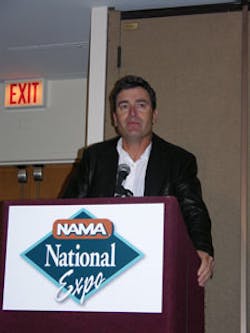NAMA Attendees Learn How Harley-Davidson Motor Co. Turned Business Around
Ken Schmidt, former public relations director at Harley-Davidson and an author on branding, came to the NAMA stage at Chicago’s Navy Pier among the chorus "Born To Be Wild," but he didn't peddle motorcycles. He instead peddled marketing strategies, including how to market to customers.
Operators struggling with a recession might take solace in learning how a company in another industry overcame a similar challenge. Harley-Davidson, recognizing the need to improve sales. took its case directly to its customers to find out what they wanted. This gave them the intelligence needed to change their message which ultimately improved sales.
Schmidt shared his experience working for the once struggling Harley-Davidson Co. In the 1980s, Harley-Davidson was on the skids, indicated Schmidt. The company was competing against lower priced and sometimes more reliable motorcycles from Honda, Suzuki, Kawasaki, and Yamaha. "When you're selling the same thing to the same people, they buy on price," said Schmidt. Cheaper motorcycles were eating away Harley-Davidson's market share. It was clear the company had to find a way to attract customers to pay its higher price point.
Schmidt joked that Harley-Davidson motorcycles are two wheels, handle bars and a seat, like any other motorcycle, but customers are willing to pay more because of the image the company created. The company was able to change its image and marketing strategy in the 1980s by being open to suggestions, meeting customers in person, encouraging passion and eliciting an emotional reaction from the consumer.
On the verge of bankruptcy, the company took action. Schmidt talked about how the company reworked its motorcycles to make them more reliable and handle better. It borrowed money for ads in the top motorcycle magazines and the new equipment was praised by critics. Still, sales didn't increase.
Forced to reevaluate its business strategies yet again, Harley-Davidson tried reaching its customers in a way no other company was doing. It took motorcycles out for demonstrations and let people ride them. The company representatives asked people what they liked, what they didn't like, and wrote down suggestions. As a result, the bikes were altered and the marketing material was changed to be more personal.
The company organized group rides so people could share their passion and feel connected. "We had to get people to like us," said Schmidt, "a relationship that would transcend price."
Harley-Davidson was successful because it stepped back from the sales numbers and looked at its business on a very human level, said Schmidt. The company recognized what attracts people and what repels people. And what attracts people, said Schmidt, are things done differently, done in a way they don't expect that surprises or delights them.
Schmidt encouraged his listeners to avoid typical marketing language such as "quality products" or "dedicated to customer satisfaction." Instead, he suggested when meeting with a potential customer, compliment them on something about themselves. When developing a marketing message, break the typical marketing pitch and have a personal conversation. This validates the other person and makes them feel good. They will be more likely to remember and buy from you. The change in marketing strategy improved sales for Harley-Davidson.
Another important marketing tool is to conduct demonstrations and ask survey questions in person. Schmidt suggested writing down suggestions, even if it's a suggestion that has already been made, as it will make the customer feel important.
The same strategies can be used in the workplace if employees are whining about the economy, stated Schmidt. Employees model their bosses, so it's up to the company owner to be passionate and appreciative. That includes positively acknowledging employees for the work they do. According to Schmidt, employees don't leave their jobs for money, but because they don't feel validated, looked after or acknowledged for the good things they do.
Operators stayed after his address to comment about the power of his speech and to take photos with him.
